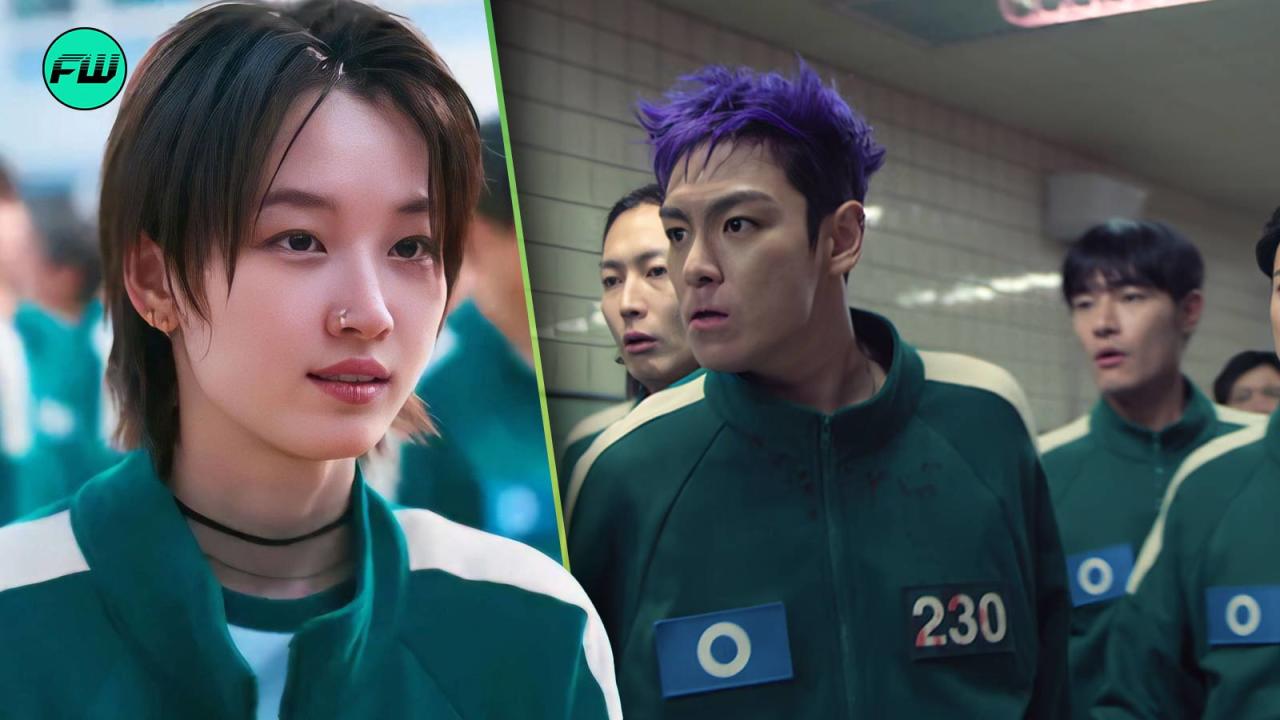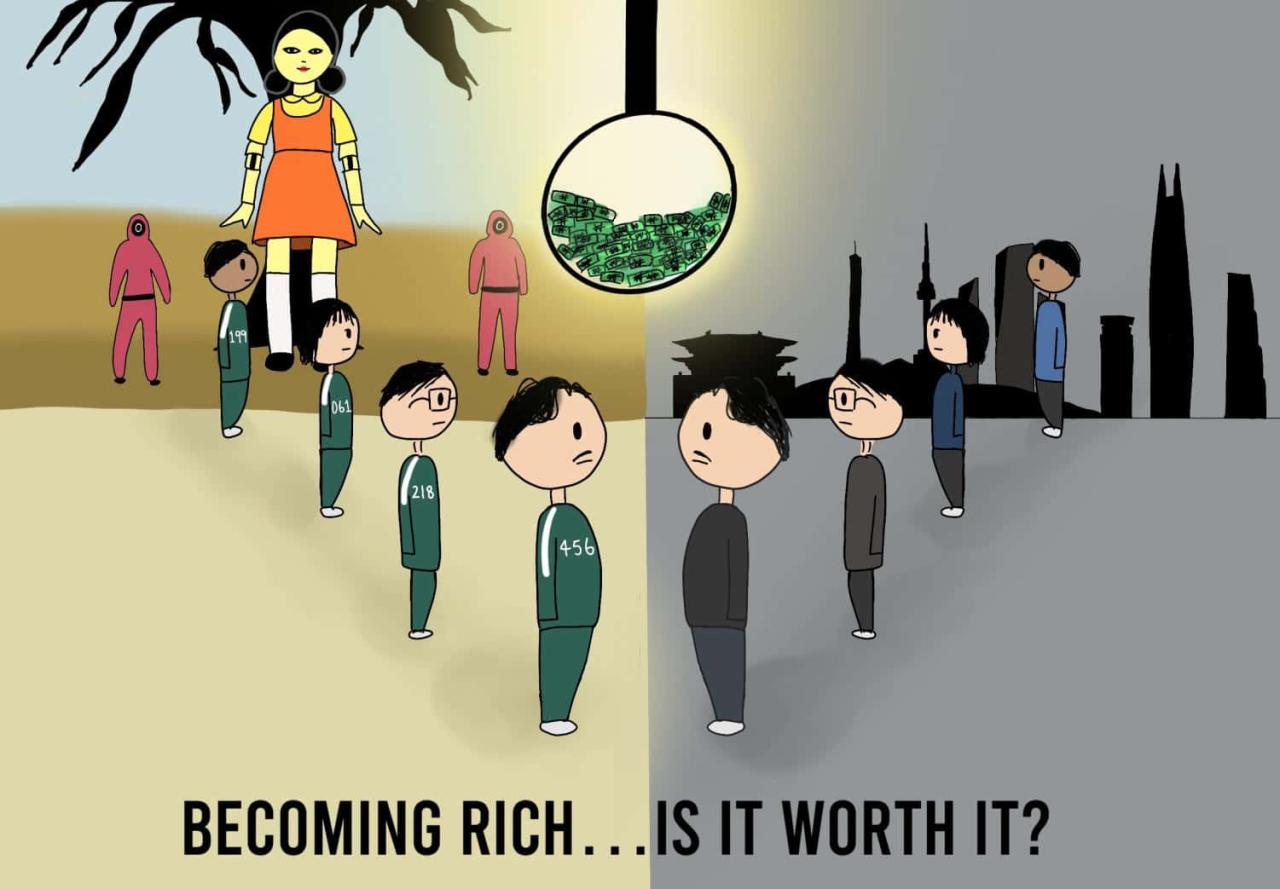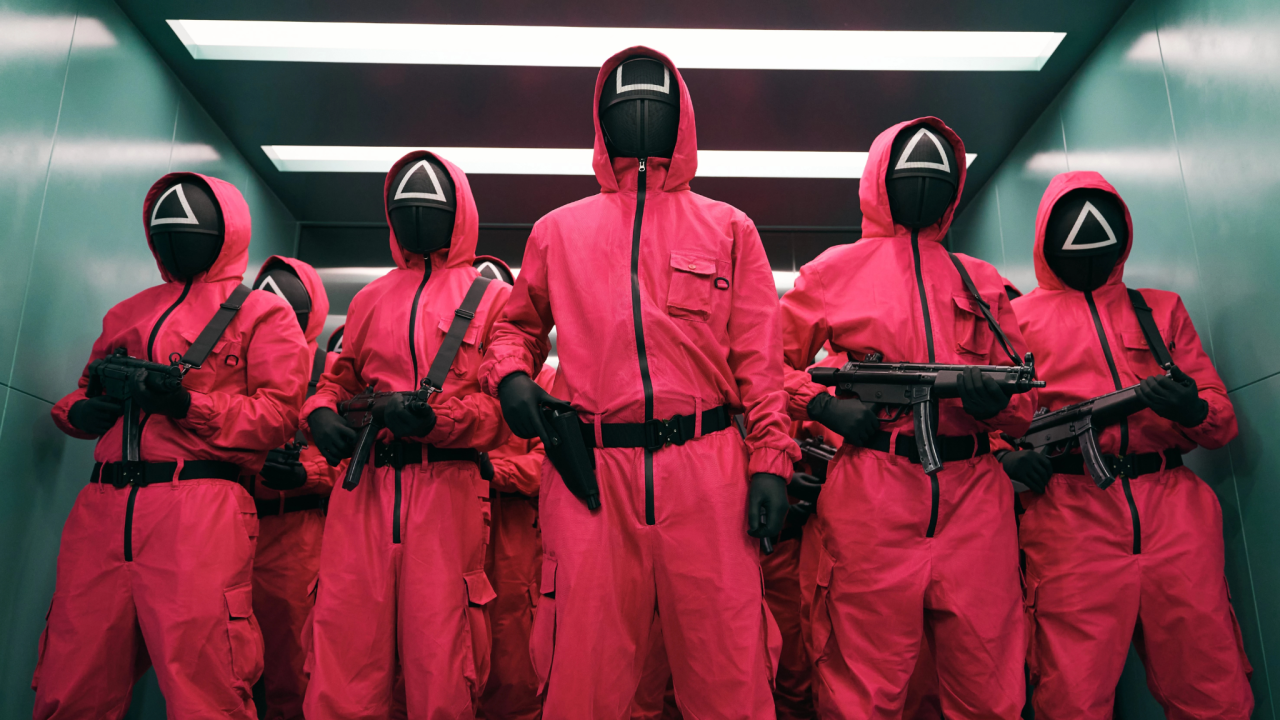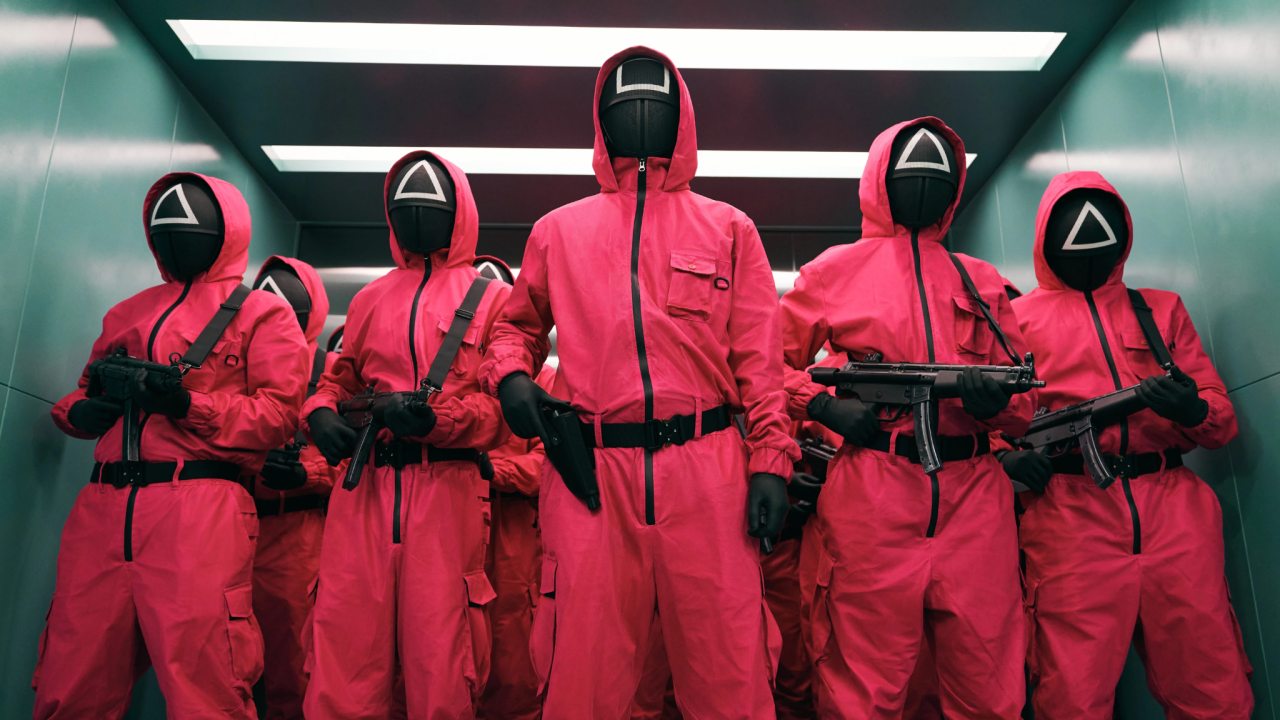Squid Game Thanos: Ever wondered what would happen if the brutal games of Squid Game met the cosmic power of Thanos? This exploration dives into a fascinating comparison, examining the shared themes of power, sacrifice, and the devastating consequences of extreme choices. We’ll analyze the moral dilemmas faced by both Gi-hun and Thanos, contrasting their motivations, methods, and the societal impact of their actions.
Get ready for a thought-provoking journey into the dark side of human nature and cosmic ambition!
We’ll unpack the power dynamics in both narratives, looking at how control is exerted and how much agency the players and characters actually have. We’ll also explore the visual symbolism – the color palettes, settings, and recurring imagery – to see how they contribute to the overall narrative. Finally, we’ll delve into fan theories and even imagine a “what if” scenario where Thanos interferes with the Squid Game itself.
Prepare to question morality, power, and the very nature of survival.
Squid Game and Thanos: A Comparative Analysis of Moral Dilemmas and Power Dynamics: Squid Game Thanos

Both Squid Game and the Avengers: Infinity War storyline, featuring Thanos’ snap, present compelling narratives exploring extreme choices, societal impact, and the complex interplay of power and morality. This analysis compares and contrasts the moral dilemmas, power dynamics, visual symbolism, and fan theories surrounding these two distinct yet thematically resonant narratives.
Okay, so you’re thinking about the Squid Game Thanos meme, right? That whole “eliminate half the population” thing? It’s pretty dark, but then you think about real-world tragedies like the devastating south korea plane crash , and the fictional scenario suddenly seems less extreme. It puts the Squid Game Thanos power in a different, sobering perspective, doesn’t it?
Makes you appreciate the fragility of life even more, and maybe question the whole “Thanos snap” idea a little more seriously.
Squid Game’s Themes and Thanos’ Snap: A Comparative Analysis, Squid game thanos

Both narratives grapple with the ethical ramifications of extreme actions taken to address perceived societal problems. Thanos aims to solve overpopulation through mass genocide, while the Squid Game’s organizers exploit desperation for entertainment and profit. The societal impact in both scenarios is devastating, resulting in widespread loss and a struggle for survival among those left behind. The consequences of their choices highlight the complex ethical implications of prioritizing a perceived greater good over individual lives.
Okay, so you’re into the whole Squid Game Thanos vibe? That’s pretty intense. It makes you think about the fragility of life, kind of like how the news about the plane crash in Halifax is hitting people. It’s a stark reminder that even seemingly safe situations can change instantly. Thinking about that really puts the Squid Game’s high-stakes games into a different perspective, doesn’t it?
| Motivation | Methods | Outcome | Moral Justification |
|---|---|---|---|
| Thanos: Restore balance to the universe by eliminating half of all life. | The Infinity Gauntlet; a snap of the fingers. | Half of all life is eradicated; widespread chaos and grief. | Thanos believes his actions are necessary, albeit brutal, to prevent universal collapse. |
| Squid Game Organizers: Profit and entertainment through the exploitation of desperate individuals. | A series of deadly children’s games. | Many participants die; the winner receives a massive sum of money. | No moral justification; their actions are purely self-serving and cruel. |
Power Dynamics and Player Agency: Squid Game vs. The Infinity Gauntlet
The narratives differ significantly in how power is wielded and challenged. Thanos’ power is absolute, derived from the Infinity Stones, allowing him to manipulate reality itself. In contrast, the Squid Game’s organizers exert control through manipulation and carefully designed games, but their power is ultimately limited by the players’ choices and unforeseen circumstances. Player agency is also starkly different.
Thanos’ victims have no agency; their fate is decided unilaterally. Squid Game participants have limited agency, but their choices within the games and their decisions to cooperate or betray each other affect the outcome.
- Thanos holds absolute, unchecked power; the Squid Game organizers’ power is more nuanced and contingent.
- Thanos’ victims have no agency; Squid Game players possess limited but meaningful agency.
- Challenge to power: Thanos’ power is challenged by the Avengers; the Squid Game’s power structure is challenged by player alliances and rebellions.
Visual Symbolism and Narrative Structure: Shared Tropes
Both narratives utilize striking visual symbolism and distinct narrative structures to enhance their themes. Squid Game employs vibrant, contrasting colors (e.g., the bright pink uniforms against the bleak, grey setting) to highlight the juxtaposition of childlike games and brutal reality. Thanos’ storyline utilizes imagery of cosmic power, decay, and inevitable fate. Both narratives build suspense through a gradual reveal of the stakes and characters’ motivations, culminating in climactic confrontations.
A potential illustration would depict two contrasting panels. The left panel would showcase a vibrant, almost childishly bright color palette (pinks, greens, yellows) representing the games, juxtaposed with stark greys and muted browns signifying the bleak reality of the Squid Game. The right panel would contrast this with a darker, cosmic palette of purples, blacks, and deep blues, representing the vastness of space and the destructive power of the Infinity Stones, with a few scattered hints of gold representing the Infinity Stones themselves.
Both panels would incorporate recurring shapes – circles for the games and sharp geometric shapes for the Infinity Stones – to visually connect the themes of control and fate.
Fan Theories and Alternate Scenarios: A “What If?” Exploration

Numerous fan theories exist regarding both narratives. Some Squid Game theories explore the possibility of Gi-hun’s actions leading to a rebellion against the organizers, while others delve into the backstories of the VIPs and the true nature of the games. In the Thanos storyline, theories often explore alternate outcomes of the snap or the potential for Thanos to be redeemed.
A hypothetical scenario: If Thanos used the Infinity Stones to influence the Squid Game, he could either manipulate the games to favor specific players or eliminate participants he deemed unworthy. The consequences could range from a more efficient, controlled elimination process to a complete breakdown of the games, depending on the extent of his intervention. This scenario offers a fascinating blend of the two narratives, exploring the clash of absolute power against the unpredictable nature of human behavior within the confines of the Squid Game.
The Role of Sacrifice and Redemption: A Moral Examination
Sacrifice plays a crucial role in both narratives. In Squid Game, characters sacrifice themselves for others, often driven by loyalty or a desire for redemption. In the Thanos storyline, sacrifices are made both by Thanos (in his twisted view) and by the Avengers who fight to reverse his actions. Redemption is a complex theme; Gi-hun ultimately chooses compassion over self-preservation, while the moral ambiguity surrounding Thanos’ actions leaves his potential for redemption open to interpretation.
- Squid Game: Sacrifices are often acts of selflessness and loyalty, leading to moral growth for some characters.
- Thanos’ Storyline: Sacrifices are made on a grand scale, with the morality of these actions being highly debatable.
Closing Summary
Ultimately, comparing Squid Game and Thanos’ snap reveals unsettling parallels in human nature’s capacity for both cruelty and resilience. Both stories highlight the devastating consequences of unchecked power and the complex moral dilemmas that arise from desperate situations. While the settings and scales differ drastically, the core themes of survival, sacrifice, and the struggle for agency resonate powerfully, prompting reflection on the choices we make and their far-reaching impacts.
So you’re into the whole “Squid Game Thanos” vibe? That’s pretty intense, right? If you’re wondering about more high-stakes games, you might want to check out when the next season is dropping – you can find out by checking this link: when is squid game season 4. Knowing that will help you prepare for more Squid Game Thanos-level craziness, hopefully.
The comparison leaves us pondering the nature of power, the cost of survival, and the enduring search for redemption.
Frequently Asked Questions
What are the main differences in the antagonists’ personalities?
Thanos is driven by a warped sense of altruism, believing his actions are necessary for the greater good. Gi-hun, on the other hand, is motivated by desperation and survival, with his morality constantly shifting throughout the game.
Could Thanos have stopped the Squid Game?
Potentially. He could have snapped away the game organizers, the players, or even altered the reality of the games themselves. The consequences of such actions are a fascinating subject for speculation.
Are there any real-world parallels to the themes explored?
Absolutely. The themes of societal inequality, desperation leading to extreme measures, and the corrupting influence of power are all relevant to current events and historical contexts.
